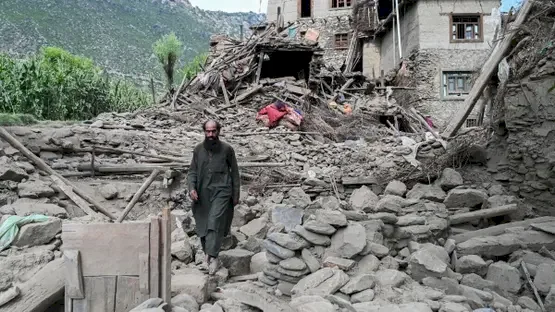
Death Toll from Afghanistan Earthquake Rises to 2200
SadaNews - The death toll from the powerful earthquake that struck eastern Afghanistan this week has risen to 2200, according to the latest statistics from authorities.
Hamidullah Fetrat, the deputy spokesman for the Afghan government, wrote on the X platform on Thursday that the vast majority of the total 2217 dead and nearly 4000 injured from the earthquake were in the mountainous province of Kunar near the border with Pakistan.
Fetrat confirmed that "rescue efforts are still ongoing" in the areas affected by the strongest earthquake, which reached a magnitude of 6 on the Richter scale.
The first earthquake, which was of magnitude 6 and one of the strongest earthquakes in Afghanistan in recent years, caused extensive damage and destruction in the provinces of Kunar and Nangarhar on Sunday when it struck at a shallow depth of ten kilometers.
A second earthquake, with a magnitude of 5.5, occurred on Tuesday, causing panic and hindering rescue efforts, as it triggered rockslides from the mountains and blocked roads leading to remote villages.
Difficult Conditions
Rescue workers continue their efforts to retrieve bodies from the rubble of houses destroyed by the earthquake in Afghanistan this week, while time is running out for survivors who face a bleak future, as global relief agencies warn of diminishing funds allocated for food, shelter, and medicine.
The Taliban government stated that search operations continued until late Wednesday in the eastern mountainous areas affected by the earthquake, where more bodies were recovered, adding that the death toll had exceeded 1457 before the announcement of the rise in the death toll on Thursday.
The International Federation of Red Cross and Red Crescent Societies stated that humanitarian needs are "vast and increasing at a rapid pace," adding that according to preliminary figures, "up to 84,000 people have been directly and indirectly affected, with thousands displaced."
Taliban authorities, who have previously dealt with the aftermath of disasters of this kind in 2022 and 2023, acknowledged that they would not be able to cope with the situation alone.
The United Nations and non-governmental organizations considered the earthquake, which was followed by six strong aftershocks, to occur "at the worst possible time," especially after they were forced to reduce their aid to Afghans at the beginning of the year due to cuts in international assistance.
Qatar launched a humanitarian air bridge to Afghanistan to assist in addressing the aftermath of the earthquake that struck the east of the country last Sunday, resulting in thousands of dead and wounded. Yesterday, Wednesday, four aircraft from the Qatari Amiri Air Force carrying humanitarian aid, including two field hospitals, food and medical supplies, and shelter materials, arrived in the capital Kabul, provided by the Qatar Development Fund for around 11,000 beneficiaries.
Source: Al Jazeera + Media outlets

International Calls to De-escalate and Warnings of Serious Consequences After Strikes on I...

Syria: 4 Killed in Suwayda Due to Iranian Missile Strike

Moscow: The Attack on Iran is Dangerous and May Lead to Catastrophe

Closure of Airspace and Interception of Iranian Missiles in Gulf States

Lebanon Rejects Involvement in Regional Conflicts

Jordanian Army Announces the Downing of Two Ballistic Missiles Targeting the Kingdom

Two Explosions Rock Jalalabad in Eastern Afghanistan... Pakistan Denies Its Fighter Jet Cr...

